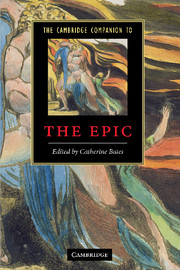Book contents
- Frontmatter
- 1 The Epic of Gilgamesh
- 2 Greek epic
- 3 Roman epic
- 4 Heroic epic poetry in the Middle Ages
- 5 Dante and the epic of transcendence
- 6 Italian Renaissance epic
- 7 Camões’s Os Lusíadas: the first modern epic
- 8 The Faerie Queene: Britain’s national monument
- 9 The seventeenth-century Protestant English epic
- 10 Mock-heroic and English poetry
- 11 Romantic re-appropriations of the epic
- 12 Ezra Pound, T.S. Eliot, and the modern epic
- 13 Derek Walcott’s Omeros
- 14 Epic in translation
- Guide to further reading
- Index
4 - Heroic epic poetry in the Middle Ages
Published online by Cambridge University Press: 28 May 2010
- Frontmatter
- 1 The Epic of Gilgamesh
- 2 Greek epic
- 3 Roman epic
- 4 Heroic epic poetry in the Middle Ages
- 5 Dante and the epic of transcendence
- 6 Italian Renaissance epic
- 7 Camões’s Os Lusíadas: the first modern epic
- 8 The Faerie Queene: Britain’s national monument
- 9 The seventeenth-century Protestant English epic
- 10 Mock-heroic and English poetry
- 11 Romantic re-appropriations of the epic
- 12 Ezra Pound, T.S. Eliot, and the modern epic
- 13 Derek Walcott’s Omeros
- 14 Epic in translation
- Guide to further reading
- Index
Summary
In his biography of Charlemagne, Einhard (d. 840) speaks highly of the emperor's educational programme and mentions among his achievements that he ordered 'the age-old narrative poems, barbarous enough, it is true, in which were celebrated the warlike deeds of the kings of ancient times' to be written down and in this way preserved for posterity. These native songs from ancient times ('barbara et antiquissima carmina') were no doubt heroic narrative songs in the vernacular, celebrating the deeds of past heroes and ancestors. Almost 750 years earlier, in his Germania, the Roman historian Tacitus had mentioned the 'ancient songs' of the Germanic peoples, which according to him reached back into a mythic past and were their only kind of historical tradition. Charlemagne's efforts to have these narrative songs recorded in writing came at a time when native oral traditions were still flourishing but when the predominant culture in the West was Latin, Christian, and literate. Charlemagne, although illiterate himself, did much for the spread of literacy, not least by gathering the leading minds of Latin Christendom at his Palace School. One of them was Alcuin, an Englishman, 'the most learned man of his time' according to Einhard. In 797 Alcuin wrote a letter to the bishop of Lindisfarne complaining that it had come to his notice that the monks in the Northumbrian monastery preferred to listen to the harpist singing vernacular heroic lays rather than to the reader of holy books in their refectory. 'What has Ingeld to do with Christ?' he asks, and continues, 'The house of the Lord is narrow, it cannot hold both.'
- Type
- Chapter
- Information
- The Cambridge Companion to the Epic , pp. 55 - 75Publisher: Cambridge University PressPrint publication year: 2010
- 4
- Cited by



